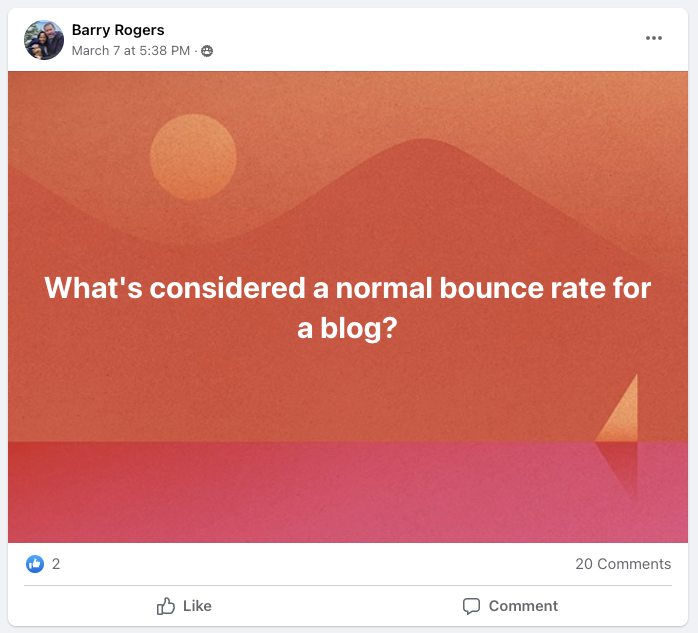A few weeks ago, someone asked in a group what would be considered a “normal” bounce rate for a blog.

It’s hardly the first time I have seen this conversation come up in the SEO community, and although I have written and talked about it before, perhaps ad nauseam, it’s worth discussing again due to recent news from Google.
What recent news from Google? We’ll get to that in a minute.
What is bounce rate?
For any discussion about bounce rate, I think it is important for us to first establish what exactly bounce rate is. A lot of people do not properly understand what bounce rate is and therefore have a flawed view of its importance, or lack thereof, in my opinion.
Straight from the horse’s mouth, a bounce in Google Analytics is:
A bounce is a single-page session on your site. In Analytics, a bounce is calculated specifically as a session that triggers only a single request to the Analytics server, such as when a user opens a single page on your site and then exits without triggering any other requests to the Analytics server during that session.
Bounce rate therefore is:
Bounce rate is single-page sessions divided by all sessions, or the percentage of all sessions on your site in which users viewed only a single page and triggered only a single request to the Analytics server.
What are sessions?
A session is a group of user interactions with your website that take place within a given time frame. For example a single session can contain multiple page views, events, social interactions, and ecommerce transactions.
Where people get this wrong is they think that a visit where a user only views one page is a bounce. In reality, it’s a visit that only pings one request to Google Analytics. Anything that causes another session to fire, will not register as a bounce.
Many people today are trying to measure user engagement on their sites where they can. One way is by using scrolling events. You can track when visitors scroll 25%, 50%, 75%, and so on down your webpage. This helps to get an idea of how much of your content on a page is being consumed. These scrolling events trigger calls to the Analytics server. If someone triggers one of these and leaves, it won’t register as a bounce.
Does Google use bounce rate as a ranking factor?
I think this discussion has been beaten to death, but the TL;DR answer is no. They do not use bounce rate as a ranking factor. How do we know? Besides Google telling us they do not, there are a few other things to consider.
First, not all websites are using Google Analytics. In fact, only the minority of webpages in existence are using it. Even if Google wanted to use bounce rate, the data would be very incomplete.
Second, bounce rate is not really an indicator of a good user experience, and we know that is what Google is interested in.
If your sink starts leaking today, you are likely going to look for a plumber. Let’s say you click on a listing, like what you see, and pick up the phone to call them. There’s no time to waste with a form submission. You need to know if someone can come help you today. After that you leave the page without ever visiting another page on their website.
That will register as a bounce, but was it a bad user experience? Did I not find exactly what I wanted? There was no need for me to scroll around their website, read blog articles, or any of that other nonsense.
Why should Google punish that site when I got what I needed?
Another example I look at is sites like Wikipedia. Now, we don’t know what the bounce rate is of Wikipedia, but I would bet it is pretty high. How often when you end up on a Wikipedia page do you really click to view other pages? Don’t you usually find exactly what you were looking for on that first page?
Google is likely also not using it because it is extremely easy to manipulate. I mentioned above how adding scrolling events would cause new requests to the Google Analytics servers and change a page’s bounce rate. You could add a scrolling event at just 10% of a scroll. How much do you think that would drop your bounce rate?
There are other events you could trigger in order to drop a page’s bounce rate.
Lastly, I mentioned at the beginning that this discussion was worth having due to recent news from Google. Last week, Google announced that in June of 2023, they were shutting down Universal Analytics, leaving us with Google Analytics 4 as the only option from Google.
What does that have to do with bounce rates? Well, in GA4 there is no tracking for bounce rate. That’s how little Google care’s about bounce rate. They aren’t even tracking it in the latest version of Analytics.
When do bounces matter?
In the opinion of most SEOs, not all bounces are equal.
There is the bounce when someone comes to your page, finds what they were looking for and leaves. Then there is the bounce when someone comes to your page, does not find what they were looking for and goes back to the Google search results and clicks on another site.
That could be a signal to Google that your page did not satisfy the search intent, and for a lot of searches it would make sense for Google to pay attention to that.
Not for all searches though. If someone is looking for advice on buying a new television or maybe they want to know what the difference is between OLED and LED screens, it would be perfectly normal for them to visit more than one webpage and collect opinions and information from more than one source.
Either way, it is something we ourselves cannot measure. Google undoubtedly has the data, but it is not shared with us.
Should you ignore bounce rate?
Yes. No. Sometimes. Maybe. It depends.
Bounce rate can seem like a really loud signal.
When you understand what it is, what it is telling you, and how it relates to your individual pages, it can be a useful metric to give you some ideas on how visitors are interacting with your pages.
A few key points I would recommend when investigating bounce rate:

Don’t look at it across your entire site
Going back to the question at the beginning that was asked in a Facebook group, there is no normal bounce rate for a blog or for a website in general. Much like CTRs, it’s not something that should be looked at across an entire site.
If you are going to pay attention to bounce rate, you should do it on a page-by-page basis.
Some pages are going to have a higher bounce rate by their very nature.
For example a contact page, could have a high bounce rate if a lot of people search for your business contact info.
I have seen pricing pages on SaaS company websites have high bounce rates. A lot of people will search for things like “Frase pricing” or “Clickup pricing”. They find the info they were looking for and leave, having not yet made the decision to purchase.
That’s totally normal.
Check the traffic in GSC
If you see a page with a high bounce rate that concerns you, the first thing I would do is look into Google Search Console and see what kind of search queries are bringing in traffic to that page. Are they all relevant? Are there some irrelevant searches bringing clicks or maybe some searches that do not entirely match the intent of that page? When that happens, of course the bounce rate is going to be high.
Focus on other metrics
To me, there are more useful metrics that you can use to measure user engagement and the user experience on your pages.
Again, scrolling events can tell you how much of your content is really being consumed or even viewed.
Exit percentages are worth investigating. What pages are people coming to and leaving your site? This can sometimes tell you where a series of pages or a funnel is breaking down and losing people.
Time on a page can tell you a lot about what the average visitor is doing. If you have two pages with the same bounce rate, but one has an average time on the page of 15 seconds and the other is 3 minutes, even though the bounce rate is exactly the same, those are much different interactions.
Before you bounce
Just remember that bounce rate by itself is not telling you the whole story of what visitors are doing on a page. If you see a bounce rate on a page that looks high, investigate a little further into the data and traffic sources. You may find there is more to the story.
Don’t get overly concerned about bounce rate. In 18 months, these conversations about bounce rate will be a thing of the past anyhow. There will be some new metric everyone will be losing their minds over.



